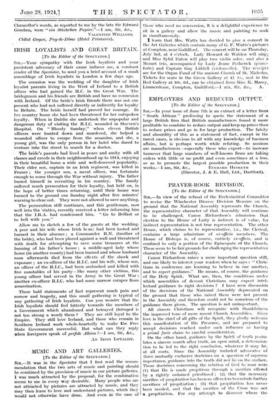IRISH LOYALISTS AND GREAT BRITAIN. [To the Editor of the
SPECTATOR.] SIR,—Your sympathy with the Irish loyalists and your persistent advocacy of their cause induces me, a constant reader of the Spectator, to send you a brief account of a small assemblage of Irish loyalists in London a few days ago.
The occasion was the wedding of the daughter of Irish loyalist parents living in the West of Ireland to a British officer who had gained the M.C. in the Great War. The bridegroom and his friends are British and have no connexion with Ireland. Of the bride's Irish friends there was not one present who had not suffered directly or indirectly for loyalty to Britain. The bride herself had proved her courage. In her country home she had been threatened for her outspoken loyalty. When in Dublin she undertook the unpopular and dangerous duty of visiting the R.I.C. wounded in Steeven's Hospital. On " Bloody Sunday," when eleven British officers were hunted down and murdered, she helped a wounded officer to escape from the assassins, and she, a young girl, was the only person in her hotel who dared to venture into the street to search for a doctor.
The bride's parents had- lived in peace and amity with all classes and creeds in their neighbourhood up to 1914, enjoying in their beautiful home a wide and well-deserved popularity. Their elder son, captain in an Irish regiment, was killed in France ; the younger son, a naval officer, was fortunate enough to come through the War without injury. The father busied himself in recruiting in his country. The family suffered much persecution for their loyalty, but held on, in the hope of better times returning, until their house was burned to the ground one Sunday night after five minutes' ;warning to clear out. They were not allowed to save anything.
The persecution still continues, and this gentleman, now well into the 'sixties, recently received a letter informing him that the I.R.A. had condemned him. " Go to Belfast or to hell with you."
Allow me to sketch a few of the guests at the wedding. A peer and his wife whose Irish hcmc. had been looted and burned in their absence ; a Commander R.N. (brother of the bride), who had been placed against a wall and threatened with death for attempting to save some treasures at the burning of his father's house ; a middle-aged lady whose home (in another county) had been burned and whose husband soon afterwards died from the effects of the shock and exposure ; an ex-officer of the R.I.C. and his wife, whose son, an officer of the R.I.C., had been ambushed and killed with five constables of his party—like many other victims, this young officer had served in the Army in the Great War ; another ex-officer R.I.C. who had some narrow escapes from assassination.
These bald statements of fact represent much pain and sorrow and tragedy, and this small gathering is typical of any gathering of Irish loyalists. Can you wonder that the Irish loyalists should feel bitterly towards the members of a Government which abandoned and betrayed (betrayed is not too strong a word) them They are still loyal to the Empire. They still love Ireland, and those who remain in Southern Ireland work whole-heartedly to make the Free State Government successful. But what can they reply when foreigners speak of perfide Albion ?—I am, Sir, &c.,
AN IRISH LOYALIST.














































 Previous page
Previous page